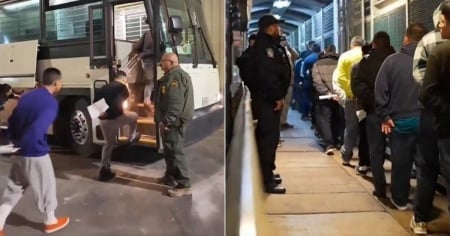
Related videos:
The U.S. government has been carrying out mass raids and deportation operations targeting illegal immigrants since last week. This situation has heightened feelings of fear and vulnerability in some communities, particularly in households with mixed immigration status families.
The first thing to consider is that each case is unique, so consulting an immigration lawyer or an accredited organization is essential to determine the best options when facing potential deportation.
Sully Bryan, an immigration attorney in the United States, explained to Univision 21 that, although the pressure has increased, the laws for submitting family or employment petitions have not changed.
"If you have a case that you can pursue through your family, do so. A resident can also submit a family petition for their partner," he noted.
Among the ways to make a request are:
- A relative who is a citizen or legal resident.
- Work, depending on the applicant's skills.
- To have been a victim of a criminal act.
Family petitions are one of the most common options. U.S. citizens can assist close relatives in obtaining permanent residency by submitting Form I-130 (Petition for Alien Relative) and, in some cases, Form I-485 to apply for permanent residency simultaneously.
It is important to highlight that requests can be made for spouses, children (whether married or single), and in the case of citizens over 21 years old, for parents and siblings.
Additionally, individuals who initiate this process must provide evidence demonstrating the familial relationship.
The attorneys Sully Bryan and Armida Mendoza advise that families should avoid seeking help from unauthorized notaries or document preparers. They recommend seeking assistance only from accredited attorneys or recognized organizations.
In a context of high uncertainty, having professional advice is key to protecting families against stricter immigration policies.
Frequently Asked Questions about Deportations and Mixed Immigration Status in the U.S.
How can families with mixed immigration status avoid deportation in the U.S.?
It is crucial to seek specialized legal advice to understand the available options, such as family or employment petitions. Consulting with accredited immigration attorneys can help determine the best strategies to avoid deportation.
What legal options do immigrants have to regularize their status in the U.S.?
Immigrants can apply for the regularization of their status through family petitions, employment, or for having been victims of crimes. U.S. citizens can submit Form I-130 to assist close relatives in obtaining permanent residence.
What should families do if ICE knocks on their door?
If ICE shows up at your home, you have the right not to open the door or answer questions. Agents can only enter with a valid court order, which they must show under the door or through a window.
How does the Cuban Adjustment Act affect Cubans in the U.S.?
The Cuban Adjustment Act allows Cubans to apply for permanent residency after one year and one day of physical presence in the U.S. Cubans with humanitarian parole can benefit from this law, minimizing their risk of deportation.
Filed under:





